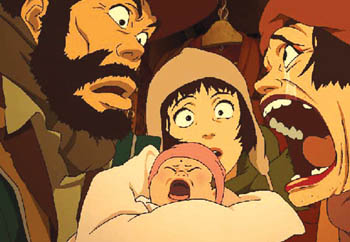![[Metroactive Movies]](/movies/gifs/movies468.gif)
[ Movies Index | Show Times | Silicon Valley | Metroactive Home | Archives ]

Bawling Alley: Three street dwellers adopt a baby in 'Tokyo Godfathers.' Raising Tokyo Satoshi Kon's 'Tokyo Godfathers' uses anime to invigorate an old-fashioned tale of three bums and a baby WE'VE HEARD all the arguments about how the poor showing of recent Disney films proves that cel animation is doomed. If anything, the failure of kid stuff like Treasure Planet and Brother Bear is more about the bottoming-out of gag writing and storytelling at Disney than it is about the end of the venerable medium of cel animation itself. The full-length Japanese cartoon Tokyo Godfathers isn't a triumph of eye-popping animation. This first-class, warmhearted movie makes a virtue of limited animation, of the sometimes immobile faces of the characters and the characters in the background. The slightly static quality of the animation matches perfectly the moments where the characters keep their faces immobile, out of hostility, disbelief or embarrassment. Of course, cartoons are supposed to be all about exaggeration. One of the three heroes, Hana, a drag queen, can be grotesque because of her big, almost Butoh-sized reactions. Hana scares the people she tries to charm; it's a running gag. Still, this anime by Satoshi Kon (he did the Brian De Palma-style anime Perfect Blue) comes across best for its uncartoony qualities, its depth of characterization. Gin, a burly drunk with a beard, a baseball cap and a missing front tooth, lives in a cardboard box in a small park in Tokyo. Hana is his platonic lover--we assume the relationship is platonic, but there's room for debate. She's been yearning for a child (the way, sigh, drag queens often do in the movies). The homeless Gin and Hana already have a surrogate child of sorts: Miyuki, an ornery teenage runaway, a walking mound of coats and scarves, like Ally Sheedy in The Breakfast Club. We meet all three on Christmas Eve, as they are being bored out of their skulls by a Christmas pageant they must sit through to get some soup. However, these three Japanese have a bit of the Christmas spirit in them, which manifests itself when they find an abandoned infant in the snow. Hana is opposed to bringing the foundling to the police straightaway. Her argument is that doing so will ruin Christmas for the child forever; every Dec. 25, she will be reminded of the day she was abandoned. Persuaded by this logic, the three friends try to puzzle out the secret of the baby's identity. The gruff Gin endures much, finally displaying heroism that atones for his life of failure. Still, he's never a lovable, cute drunk, and he drinks too much at the most inconvenient times. He possesses a mean streak, and he lies about his past. He gets jumped on by a group of bored teens--they don't interrupt their cell phone calls while they stomp this wino. Tokyo Godfathers isn't a pleasant fantasia of the vagabond life; rather it contains reportorial sequences about what happens to people who live on the streets. When Hana tells a Japanese folk tale that explains his feelings for Gin, it's clear this isn't a story of a sacrificial homosexual ready to die to preserve the straights. Hana understands that she makes people uncomfortable, and she knows how to use that power as a lever. And Miyuki isn't any dutiful daughter, either. In one moment, where the three are encamped in a hovel alive with alley cats, Gin comments that he could use some meat: Miyuki leads all the cats in a group snarl. She's not at all a figure from the kind of anime we're accustomed to, with the big-eyed girls in their sailor suits. Tokyo Godfathers uses a venerable movie plot that goes back to John Ford's Three Godfathers and beyond. The computer-animated Ice Age was a recent take on the tale; film scholar Leslie Halliwell proposes that the first version of the tale was a 1909 movie starring Niles' own Bronco Billy Anderson. The only thing interesting about a baby is the emotions it stimulates in the people around it. As in Raising Arizona, the infant brings out violent yearnings and bad behavior. It's surprising to see how the gentling, filtering quality of animation can make an appealing story out of what could have been sloppy in a live-action film. Even the big car-chase finale is far more entertaining than it would have been in a live-action movie. Despite a moment or two of baby kitsch--a dream sequence where the baby turns into a winged angel--Tokyo Godfathers is full of mordant humor and honest tenderness. Tokyo itself is a character in the movie. The city sprawls, frozen in midwinter, covered in icy fog that makes the Eiffel Tower-like Tokyo Tower glow blurrily orange. As the baby's protectors stumble toward the solution, they meet various citizens: shopkeepers who want to give them the bum's rush; train commuters who glare at them over their germ masks; a gaggle of neighborhood ladies who come out to gossip about the conduct of since-departed neighbors; a fat, grotesque gangster who changes their luck. By the end, they have, unbeknownst to themselves, re-entered society. But you're not unhappy about it, because they re-enter on their own terms. They're still true to themselves when the happy ending arrives.
Tokyo Godfathers (PG-13; 92 min.), an animated feature by Satoshi Kon, opens Friday at the Camera 3 in San Jose.
Send a letter to the editor about this story to letters@metronews.com. [ Silicon Valley | Metroactive Home | Archives ]
|
From the January 29-February 4, 2004 issue of Metro, Silicon Valley's Weekly Newspaper.
Copyright © Metro Publishing Inc. Metroactive is affiliated with the Boulevards Network.
For more information about the San Jose/Silicon Valley area, visit sanjose.com.